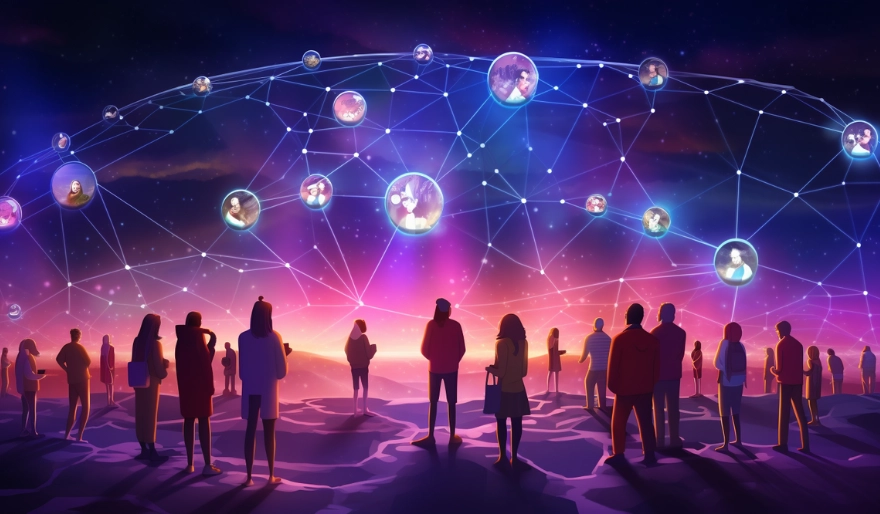Unlocking the Power of Decentralized Social Media and Social Gaming: A Symbiotic Relationship in the Digital Age
In the digital age, social media and gaming have become an integral part of our daily lives, revolutionizing our social interactions and creating gamified communities. However, these industries are currently centralized, with platforms like Facebook and Instagram holding control over our digital experiences. But what if there was a way to unlock the power of decentralized social media and social gaming, creating a symbiotic relationship that goes beyond centralization? November 18, 2023 16:25
This blog explores the fusion of decentralized social media and social gaming, discussing the game-changing connections, tokenized experiences, and the revolutionizing potential of blockchain integration. Get ready to dive into the future of digital societies and the emergence of Web3.0!
Understanding decentralized social media and social gaming
To truly grasp the potential of decentralized social media and social gaming, it's essential to understand what these terms mean. Decentralized social media refers to platforms that operate on a peer-to-peer network, where no single entity controls the platform or its content. Instead, decisions are made collectively by the community through consensus mechanisms like blockchain technology.
Similarly, decentralized social gaming takes gaming experiences to the next level by leveraging blockchain technology. It allows players to own and trade in-game assets, creating real-world value and fostering a sense of ownership and control over their virtual experiences.
By decentralizing social media and gaming, users gain more power and control over their digital lives. They are no longer subject to the rules and restrictions imposed by centralized platforms. Instead, they have a say in the platform's governance and can be rewarded for their contributions and engagement.
In the next section, we'll delve deeper into the connections between decentralized social media and social gaming and explore the unique features and opportunities they bring to the digital landscape.
The power of decentralized social media
Decentralized social media offers a myriad of advantages that empower users and revolutionize the way we engage with digital content. One of the main strengths of decentralized social media is its ability to promote transparency and data privacy. Unlike centralized platforms that collect and monetize user data without consent, decentralized social media allows users to retain ownership and control over their personal information.
Furthermore, decentralized social media fosters a sense of community and inclusivity. By eliminating the need for intermediaries, such as platform administrators or content moderators, users can engage in direct peer-to-peer interactions. This decentralized approach ensures that all voices are heard, regardless of geographic location, social status, or personal beliefs.
Another key aspect of decentralized social media is its resilience to censorship and manipulation. With a distributed network of nodes, it becomes nearly impossible for a single authority to manipulate or control the platform's content or algorithms for their own agenda. In other words, decentralized social media truly puts power back into the hands of the users.
In the upcoming section, we will explore the advantages of decentralized social gaming and how it complements the power of decentralized social media, creating a symbiotic relationship that has the potential to reshape the digital landscape. Stay tuned!
The symbiotic relationship between decentralized social media and social gaming
As we’ve explored the numerous advantages of decentralized social media, it’s important to recognize how social gaming fits into this equation. Social gaming, much like decentralized social media, has seen a surge in popularity in recent years. It offers users the opportunity to connect, compete, and collaborate in a digital environment.
Decentralized social gaming takes this a step further by leveraging the power of blockchain technology. By utilizing smart contracts and decentralized networks, social gaming becomes more transparent, secure, and fair. This means that gamers can truly own and trade in-game assets or even earn real-world rewards for their achievements.
The symbiotic relationship between decentralized social media and social gaming lies in their shared principles of transparency, community, and empowerment. Both ecosystems thrive on user engagement and rely on peer-to-peer interactions to flourish. As decentralized social media offers a platform for communication and sharing, social gaming provides an avenue for entertainment and socialization.
Together, these two realms empower users, allowing them to connect, create, and explore in ways that were previously unimaginable. By embracing the combined power of decentralized social media and social gaming, we are witnessing the dawn of a digital revolution that champions user autonomy and fosters a truly inclusive online environment.
In the next section, we will delve deeper into the specific benefits of decentralized social gaming and how it enhances the overall user experience. Stay tuned as we continue to unlock the potential of this symbiotic relationship in the digital age.
The benefits and opportunities for businesses in the digital age
In addition to the advantages for users, decentralized social gaming also presents numerous benefits and opportunities for businesses in the digital age. As more people engage with social gaming platforms, businesses have a unique opportunity to reach a highly engaged audience and promote their products or services.
One major benefit for businesses is the increased transparency offered by decentralized social gaming. With blockchain technology, all transactions and interactions within the gaming ecosystem can be recorded on an immutable ledger, providing a level of transparency that traditional gaming platforms cannot match. This transparency builds trust between businesses and consumers, fostering long-term relationships and customer loyalty.
Furthermore, the decentralized nature of social gaming allows for new revenue streams for businesses. In-game purchases and virtual assets can be traded on decentralized marketplaces, creating opportunities for businesses to monetize their products in ways that were not possible before. This opens up a completely new avenue for revenue generation and can significantly boost a business's bottom line.
Additionally, decentralized social gaming platforms often have built-in token economies. These token economies enable businesses to create their own branded tokens, which can be used as loyalty points, rewards, or even as a medium of exchange within the gaming ecosystem. This not only incentivizes user engagement but also provides a direct means for businesses to promote their products or services within the gaming environment.
In conclusion, decentralized social gaming offers businesses a range of benefits, from increased transparency to new revenue streams. By leveraging the power of blockchain technology and embracing this symbiotic relationship with decentralized social media, businesses can tap into a growing market and connect with a highly engaged audience in ways that were previously unimaginable. In the next section, we will explore real-world examples of businesses leveraging decentralized social gaming to drive growth and innovation. Stay tuned to discover the exciting potential of this digital revolution.
Strategies for unlocking the power of decentralized social media and social gaming
Now that we understand the benefits and potential of decentralized social gaming for businesses in the digital age, let's explore some strategies to unlock its power and drive growth and innovation.
1. Embrace blockchain technology: To fully leverage the transparency and security offered by decentralized social gaming, businesses should embrace blockchain technology. This means integrating blockchain into their infrastructure and utilizing features such as smart contracts and decentralized marketplaces to create a seamless user experience.
2. Build a loyal community: In decentralized social gaming, community is everything. Businesses should focus on building a loyal and engaged community by providing quality, immersive experiences and rewarding users for their participation. This can be done through in-game rewards, exclusive access to content, or special events that encourage collaboration and competition.
3. Collaborate with influencers: Influencers play a crucial role in driving user engagement and spreading awareness about games or products. By partnering with influencers who have a strong presence in the gaming community, businesses can reach a wider audience and build credibility.
4. Leverage user-generated content: User-generated content is a powerful tool for businesses in decentralized social gaming. Encouraging users to create and share their own content, such as gameplays or artwork, not only adds value to the gaming ecosystem but also generates buzz and increases brand visibility.
5. Innovate and iterate: The decentralized social gaming landscape is constantly evolving. To stay ahead of the competition, businesses must continuously innovate and iterate their products and services. This includes incorporating user feedback, monitoring trends in the gaming industry, and exploring new technologies and features.
By implementing these strategies, businesses can unlock the true potential of decentralized social media and social gaming. It's an exciting time to be a part of this digital revolution. In the next section, we will dive into real-world examples and success stories of businesses that have harnessed the power of decentralized social gaming to drive growth and innovation. Stay tuned and get inspired!
Future prospects
In conclusion, decentralized social media and social gaming represent a symbiotic relationship that has the power to disrupt and revolutionize the digital landscape. By embracing blockchain technology, building a loyal community, collaborating with influencers, leveraging user-generated content, and constantly innovating, businesses can unlock new levels of growth and innovation.
Looking ahead, the future prospects for decentralized social media and social gaming are promising. As more businesses and users recognize the benefits and potential of this decentralized ecosystem, we can expect to see increased adoption and investment in this space. This will lead to further advancements in technology, user experience, and revenue models.
Furthermore, with the rise of virtual reality (VR) and augmented reality (AR), the possibilities for immersive and interactive experiences within decentralized social gaming are expanding. We can anticipate a future where users can not only play games but also socialize and interact with others in virtual worlds, further blurring the lines between reality and the digital realm.
In the next section, we will delve into real-world examples and success stories of businesses that have successfully harnessed the power of decentralized social gaming. These inspiring cases will demonstrate the immense potential and opportunities that await those who are willing to embrace this digital revolution. So, stay tuned and get ready to be amazed by the transformative power of decentralized social media and social gaming!
User Comments (0)
Popular DeSo Apps










